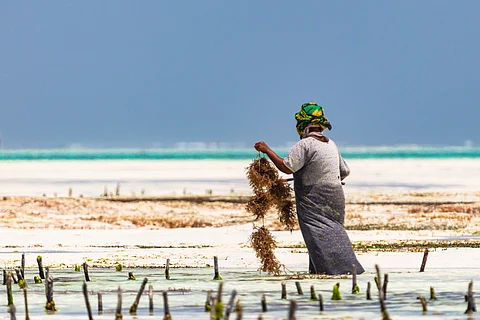

A seaweed farmer in Paje, Zanzibar, Tanzania. Around 80% of all seaweed producers in Zanzibar are women.
Photo: Marius Dobilas / Adobe Stock.
NMB Bank has entered into a partnership with the Zanzibar Seaweed Company (ZASCO), a state-owned entity, through a Memorandum of Understanding (MoU) aimed at enhancing the seaweed farming sector in Zanzibar, Tanzania, according to local news reports.
The collaboration, signed at the end of March, is billed as part of NMB's commitment to support sustainable economic growth in the region, particularly by backing Zanzibar’s Blue Economy policy.
The bank plans to improve the efficiency of smallholder seaweed farmers by offering customized banking solutions, financial education, and technical training directly at the community level.
Zanzibar, an archipelagic state within the United Republic of Tanzania, has a predominantly agricultural economy. Although seaweed accounted for less than 1% of its total agricultural production in 2019, it is nevertheless one of Zanzibar's most lucrative crops. In 2019, seaweed exports reached almost 10,000 tons, achieving just over 21% of the state's total export value.
Most of Zanzibar's seaweed farmers are women. According to Zanzibar government data, in 2019, seaweed was farmed in over 56 villages in Zanzibar and employed 12,903 farmers, of which approximately 80% were women.
The agreement with NMB bank is thus seen as a strategic move to not only add value to the seaweed produced in Zanzibar but also to increase the island's foreign export earnings.
ZASCO Director, Dr Masoud Rashid Mohammed, reportedly described the MoU as a "game changer" for the industry.
ZASCO has recently begun constructing a 30-tonne capacity seaweed processing plant in Zanzibar, with an investment of 8 billion Tanzanian Shillings (USD 3.1 million / EUR 2.9 million).
Once complete, the facility, the largest in Africa, will process seaweed before export, thereby ensuring farmers can secure better prices in the global market.
Zanzibar’s Trade and Industrial Development Minister, Omar Said Shabani, said he believed seaweed has the potential to surpass cloves as Zanzibar’s top foreign exchange generator, thanks to its higher market value and the focus on value addition.
“The price of seaweed is higher than that of cloves at the world market. With ample investment, especially in value addition for seaweed, Zanzibar will be in position to get more foreign exchange,” he is quoted as saying by Tanzanian news outlet, Daily News.
